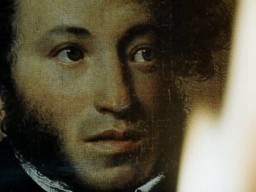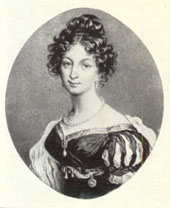
In the course of my studies of Russian language and literature, there has long been the enormous, looming figure of Alexander Sergeivich Pushkin (1799-1837), Russia’s most celebrated poet. Thinking it was about time I tried translating some of his work, I turned to a poem that is one of the handful of Russian poems that I have committed to memory (another is Osip Mandelstam’s Leningrad, my translation of which is included in an earlier post). The process of trying to render the poem, К. . . (To. . . ), into English has led me to consider some things about the nature of language and translation. I will write a little about these musings before presenting my translation.

I believe that magic is real, and that any person who can speak, write, paint or fashion anything so as to convey an idea or a feeling is a sorcerer. While I see a supernatural power in any art for its ability to effect profound physical, emotional and psychological changes in a person in the absence of bodily contact, I consider language to be the most powerful and mystical form. Reading a newspaper is like gazing into a crystal ball, a history book is a time machine, a story teller is a conjuror who brings into being entire worlds, characters, myths and legends. The power of words and language is acknowledged in the mystery of things like runes, and tales that speak of the special power of the true names of things. Certain words, like “abracadabra”, have meaning only in relation to magic.
Poets are especially skilled practitioners at these wizarding arts. Their ability to marry the power of language with that of song increases the effect of both. Individual words truly do have power, and there are innumerable ways these can be combined to represent sense and feeling. Rhythm and melody clearly have the magic of causing people to move around, often frantically and in strange ways; many call this “dancing”.
In Russia, Alexander Pushkin is still considered one of, if not the, most accomplished of the word wizards. The name “Pushkin” itself has its own power among Russian speakers; it is synonymous with the potent beauty of exquisitely crafted language. The importance of Pushkin goes so far beyond Russia and Russian culture that his work begs to be translated. But there is the rub; translating a magic spell from one language to another is made difficult if not impossible by the fact that the language itself is integral to the power of the spell. Each language has its own resources for combining melody, harmony and meaning. The sound and connotations of each word are crucial to the capacity of a poem to enchant.
There are a number of ways to approach this seemingly impossible task of translating such art. Each has its own emphasis on elements of the form or meaning, but none can capture everything about the original. One can give as accurate a literal translation as possible, but invariably harmony and meter must be sacrificed; but to preserve the musical elements, the meaning often has to be manipulated, with substitutions made for some of the imagery and metaphor of the original. I was presented with an excellent example of this kind of difficulty in trying to translate this poem by Pushkin: a word used twice to end a stanza, in fact the last word of the poem, is a form of “любовь”—“love”. Given the potent and magical power of this word in both languages, it was clear to me that no synonym could be used in substitution. But Pushkin has the luxury of being able to rhyme the words for “my”, and “anew” with “love”. The task is made easier in Russian by the fact that in its basic form the word for love is “lyubov”, but if you say without love, the word is “lyubvi””. So you have a number of forms of the word to work with. Try rhyming anything that remotely approximates these meanings with “love” in English. You’ve got “dove”, “glove”, “shove”, “of” and above”, and that’s about it.
So much for my preemptive apology. I now humbly submit for your consideration my translation of one of A.S. Pushkin’s poems; at the bottom is a link to an audio file of me reading the original:
To. . .
I recall the wondrous chance:
There before me I saw you
Such a brief and a passing glance
Such beauty, brilliant and true
In the clutches of hopeless despair
In the worries of life’s hurried storm
For long I heard a voice so fair
And dreamt of a lovely form
Years passed. A rebellious tempest’s blare
Scattered all former dreams
And I forgot your voice so fair,
Your form born of heavenly schemes
In solitude, in gloomy desolation
Quietly my days dragged along
Without God and without inspiration
Without tears, without life, without love
To my soul came an urge to dance:
And there again I saw you
Such a brief and a passing glance
Such beauty, brilliant and true
And my heart beat in adulation
And to it came the rebirth of
God, and divine inspiration
And life, and tears, and love
Alexander Sergeivich Pushkin
mp3 file; me reading the Russian original (American accent and all)
© 2013, John Dougherty. All rights reserved

This is by far the best translation of the poem I read. You should translate his other poems! Thank you!
Thanks. Translating this was a labor of love (no pun intended). I love this poem.
Prof Dougherty
The stressed syllable of the first adjective, in the first line, of the poem “К” is on the first part of the word “ЧУдное” (ый, ая, ое, ые). “Я ПОмню ЧУдное мгноВЕнье: … Thank you.